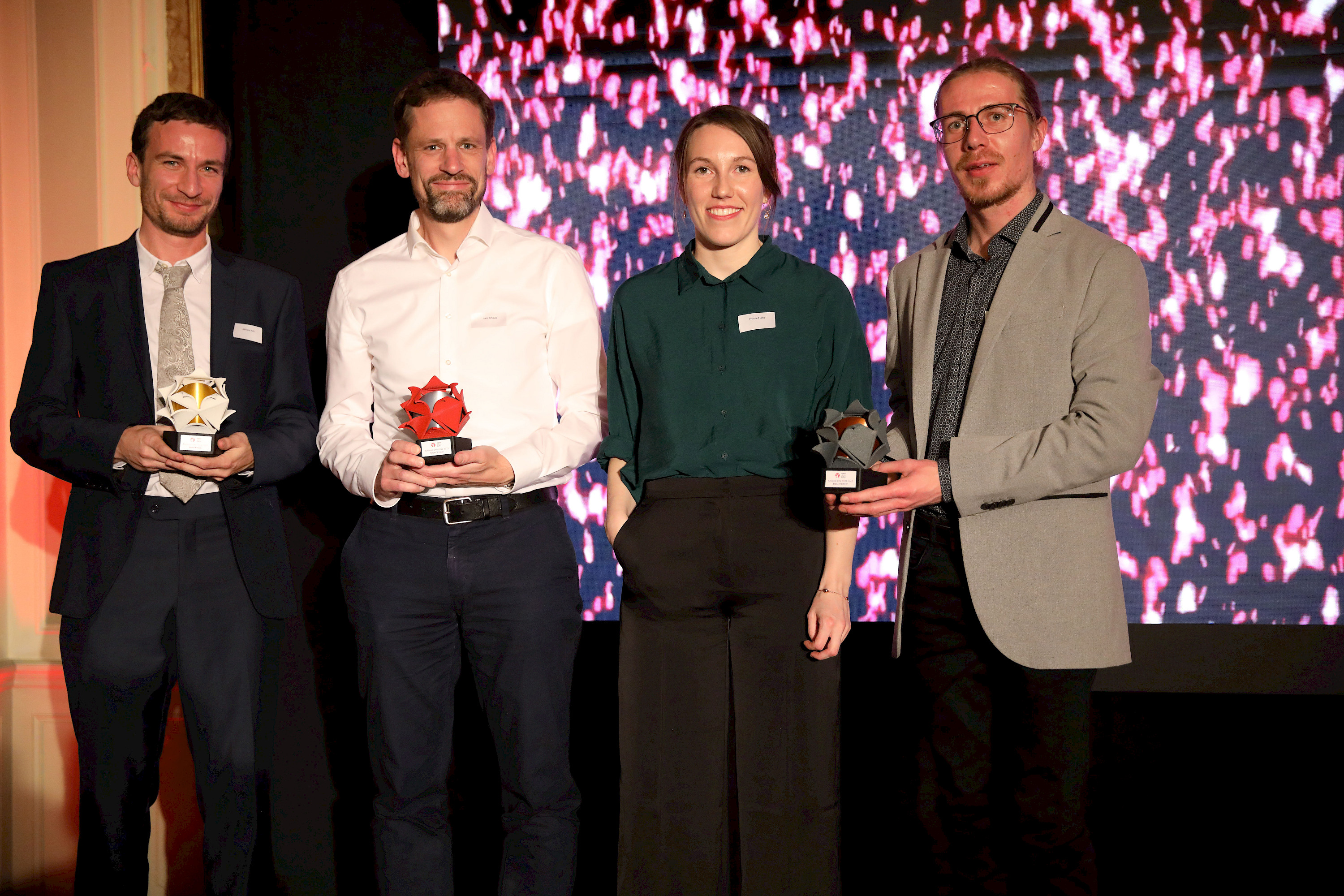Open Research Data
Transparency triumphs: Adriano Rutz wins the first National Open Research Data Prize
Author: Patrizia Widmer

“If science wants to benefit society, it must be open.” These are the words with which Marcel Tanner, President of the Swiss Academies of Arts and Sciences, opened the award ceremony for the National Open Research Data Prize. The award was presented for the first time on 6 December 2023 – a milestone in the field of Open Science in Switzerland. The theme of this year’s Prize was “The re-use of research data”. The award ceremony took place in the premises of the Grande Société in Berne and was hosted by journalist and moderator Karin Frei.
Open Research Data as a path for the future
The new Open Research Data Prize acknowledges innovative scientific practices and is intended to drive forward the shift to open research practices. Open Research Data (ORD) is a sub-field of Open Science and means that researchers facilitate access to research data and enable it to be re-used. Openly-accessible data should make research results more transparent and more reproducible. Furthermore, ORD promotes interdisciplinary collaboration, which drives scientific creativity and innovation.
The Award is part of the National Action Plan for ORD, which is based on a national strategy.The strategy and action plan were published in 2021, as Switzerland still has great potential with regard to Open Science practices. For example, there is a lack of guidelines and incentives for implementing ORD practices. As a result, open research practices have not yet become fully established in Switzerland. “Researchers still behave as if they were hunters and gatherers when it comes to their data,” said Marcel Tanner during his address. The Prize is intended to counteract such behaviour.
This year’s winners
The gold award and prize money of CHF 10,000 went to Adriano Rutz for “The LOTUSInitiative”. He researches in the field of molecular systems biology at ETH Zurich. His open-science database archives 750,000 links between chemical structures and biological organisms, in order to disseminate knowledge in natural products research. The database is free of charge and publicly-accessible. In the discussion following the ceremony, Rutz emphasized that, when it comes to Open Science, he had been able to learn a lot from researchers around him. Already as a student, he noticed that access to open data was difficult and he is now making his contribution to making research more open. The winner dreams “of a future in which knowledge knows no limits”.
The silver trophy and prize money of CHF 7,000 were won by Hans-Peter Schaub from the University of Bern for the “Swissvotes” project. The database provides comprehensive information on Swiss referendums since 1848, thereby supporting participation in, and research into, the policy-making process. The bronze prize went to Yvonne Fuchs and Dominic Weber for their “transcriptiones” project, which was developed at the University of Basel. The platform facilitates access to historical transcriptions for researchers and other interested parties. The bronze prize is endowed with CHF 4,000.
Both the jury’s composition and the group of winners were characterized by the fact that they included researchers from all career stages. 36 projects were submitted for the Prize. It was noeasy task for the interdisciplinary jury to select the winners. Therefore, in addition to the winning projects, they honoured four others from EPFL, Eawag and the University of Geneva with “Honorable Mentions”.
The trophies awarded are 3D-printed customized objects with a deeper meaning: Andres David Bucher and Julian Dederke designed them as part of a competition. The result was a geometric shape - an icosahedron – which encloses a sphere representing the valuable research data. Icosahedra are very important in nature and science, for example, many viruses have an icosahedral symmetry. The icosahedron is partly open, partly closed and only allows in places a glimpse of the shiny metallic surface underneath. The prize sculpture thus symbolizes today’s research practices - which are only partially open - and the path to truly-open research.
Breaking down outdated structures
Two Open-Science experts - Frank Miedema and Toma Susi - explained to the audience in their presentations how important open-research practices are, why the science system is not already more open and that researchers need more incentives to pursue Open Science.
Frank Miedema talked about his academic career: he had learnt to sell his science skilfully, as financial backers had played a decisive role in the selection of each of his research topics.How he asserted himself against competitors determined whether or not he received research funding. At first sight, making scientific data publicly accessible does not fit into this competition-oriented system. He calls these outdated research structures “a game” in which young researchers have to participate if they want to pursue a successful career.
Toma Susi even called the career ladder a “dysfunctional game of prestige”. What, in his opinion, can help to counter this is: “Prizes like this one are particularly important in the transitional phase towards open-research practices that we currently find ourselves in. They show some examples and advantages of Open Science.” The National ORD Strategy also calls for more incentives and rewards for Open Science endeavours. In the end, everyonebenefits when research becomes more open: ORD improves the quality of research, speeds up scientific discoveries and thus contributes to the democratization of knowledge.
The National ORD Prize will be awarded again in 2024 so as to further motivate researchers to take the initiative in the field of Open Science. Olivia Denk, Head of the Swiss Academies’ ORD Coordination Office, made this announcement at the end of the event, before the guests moved on to an aperitif, over which they continued to discuss Open Science and engage in interdisciplinary networking, to the sound of the Frische Fische band.
